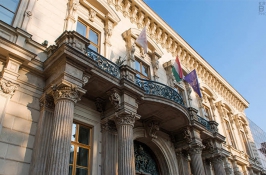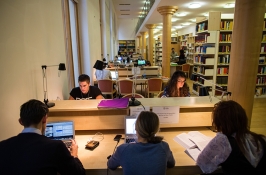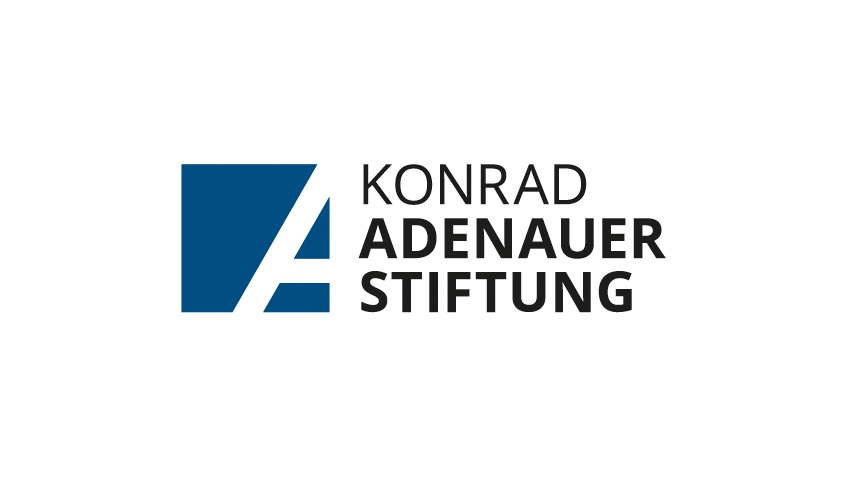Historically, all border regions in Europe have been disadvantaged in many respects due to their peripheral location. This has only changed for the better in the recent past due to the EU and especially the Schengen area. In some parts of Europe, border regions have benefited particularly from the common internal market and its deepening due to the abolition of border controls and the expansion of cross-border cooperation. One such region is the greater SaarLorLux region. But even there, the experiences are mixed and the potential for improvement is still great.
Only a few figures suffice to show the importance of border regions for the development of the EU: One third of the EU population lives in border regions, which make up 40 percent of the EU territory. Some small countries consist only or almost only of border regions. More than two million EU citizens cross a national border every day as "cross-border commuters" to get to their place of work.
The aim of the conference is to exchange ideas on experiences ("best practice") and on the potential of cross-border cooperation between academics, politicians and practitioners from Germany (NRW, Rhineland-Palatinate, Saarland), France, Belgium and Luxembourg on the one hand and Hungary, Croatia, Slovenia and Serbia on the other.
Programme
Thursday, 14 October
18.30 Opening Remarks
Professor Dr. Zoltán PÁLLINGER
Rector, Andrássy University Budapest
Michael WINZER
Resident Representative, Konrad-Adenauer-Stiftung, Hungary
18.50 Introduction of the two Ministers
Dr. Heinrich KREFT
Holder of the Chair of Diplomacy II and Head of the Centre for Diplomacy at the AUB
The Importance of Cross-border Cooperation in Europe from Hungarian and Croatian perspective
19.00 Judit VARGA (TBC)
Hungarian Minister of Justice
19.30 Natasa TRAMISAK (TBC)
Croatian Minister for Regional Development and EU-Funds
Reception
Friday, 15. October
8.30 Short Thematic Introduction
Dr. Heinrich KREFT
Holder of the Chair of Diplomacy II and Head of the Centre for Diplomacy at the AUB
8.45 The Development of Cross-border Cooperation in the "Greater Region" "SaarLorLux" between Germany (Saarland/Rhineland-Palatinate), France (Lorraine/Grand Est), Luxembourg and Belgium (East Belgium/Wallonia/Brussels)
Jun.-Prof. Dr. Florian WEBER
European Studies/ Focus on Western Europe and Border Areas, Faculty of Empirical Human Sciences and Economics, Saarland University
Successes and Challenges of Cross-border Cooperation in the "Greater Region" - Insights from Practice
9:30 North Rhine-Westphalia and the Development of Cross-Border-Cooperation
Mark SPEICH
State Secretary for Federal, European and International Affairs, State of North Rhine-Westphalia
The Political Project of Cross-border Cooperation from a German perspective
Bernhard KASTER MdB a.D.
Mayor (ret.) Trier-Land
Cross-border Cooperation – the Outcomes of the Franco-German Reconciliation
Christophe AREND
Member of the Assemblée Nationale, France (via ZOOM)
10.30 Coffee Break
11.00 Successes and Problems - Insights from Practice (Part II)
The Legal Challenges of Cross-border Cooperation
The Concept of the "Cross-Border Mechanism" – a Luxembourg Proposal
Léon GLODEN
Member of the Luxembourg Parliament and Mayor of Grevenmacher
Cross-border Economic and Cultural Cooperation
Ralf BRITTEN
Head of Department of the City of Trier and President of the German-Luxembourg Business Initiative
Cross-border Cooperation in the Areas of Safety and Health – Experience with the Corona Pandemic
Günther SCHARTZ
Prefect, District Trier-Saarburg
The Importance of INTERREG Projects for Cross-border Cooperation
Pascal ARIMONT
MEP, full member of the Committee on Regional Development, INTERREG negotiator. EPP Vice-Coordinator in the East Belgium Regional Policy Committee (participation via ZOOM)
13.30 Lunch
14.30 Hungary's Relations with Slovenia, Croatia and Serbia
An Overview of Contemporary History
Ferenc NÉMETH
Research Fellow, Institute for Foreign Affairs and Trade, Budapest
Status and Potential of Cross-border Cooperation
From Hungarian Perspective
Gyula OCSKAY
Head of European Institute of Cross-Border Studies and Secretary General of CESCI
From Croatian Perspective
Minister Natasa TRAMISAK
Ministry of Regional Development and EU-Funds, Croatia
From Serbian Perspective
Aleksander SIMURDIC
Director of the European Affairs Fund of AP Vojvodina
From Slovenian Perspective
Tina VUGA (TBC)
Head of the Unit for International Cooperation, Ministry of Education, Slovenia
16.30 Coffee Break
17.00 Status and Potential of Cross-border Cooperation from the Perspective of Hungarian, Slovenian, Croatian and Serbian Border Municipalities (panel discussion between local politicians and municipal representatives)
Zoltán BALI (TBC)
Deputy Mayor, Zalaegerszeg, Hungary
Janesz MAGYAR
Mayor, Lendava, Slovenia
NN (TBC)
Croatia
Sanda SIMIC STAMBOLIC
Assistant Director, Department for Cross-border and transnational cooperation Programmes, Ministry of EU-Integration, Government of Serbia
18:00 Pre-Dinner speech
„Do we need a European Business Law?“
Roland THEIS
State Secretary for Europe, Ministry for Europe, Justice and Finance, Saarland
Saturday, 16 October
9:00 Presentation of the INTERREG Projects Programme of the EU
Katalin KOVÁCS-TOPERCZER
Senior Economic Advisor
Representation of the European Commission in Hungary
9:45 Coffee break
10:15 Similarities and Differences between the "Greater Region" (SaarLorLux) and Hungary-Slovenia-Croatia-Serbia.
Moderated Discussion between all Speakers with Questions from the Audience
Moderation:
Dr. Heinrich KREFT
Holder of the Chair of Diplomacy II and Head of the Centre for Diplomacy at the AUB
12.00 Lunch
Covid Information
The 3-G rule (tested, recovered or fully vaccinated) applies throughout the campus of the Andrássy University Budapest. Proof of this must be presented when entering the university. In the case of testing, official proof of a negative PCR test (not older than 72 hours) or an antigen test (not older than 48 hours) must be presented.
Please note that it is compulsory to wear a mask in closed rooms at the AUB (except the speaker in a speech).
For further information please visit this site: Covid Information



 ETN
QuickLinks
Contact
ETN
QuickLinks
Contact
 Start Your Studies!
Scholarships
Degree Programmes
PH.D. Programme
Admission
Alumni Association
Start Your Studies!
Scholarships
Degree Programmes
PH.D. Programme
Admission
Alumni Association
 Subscribe to our newsletter
Subscribe to our newsletter







